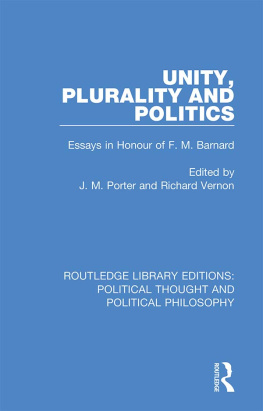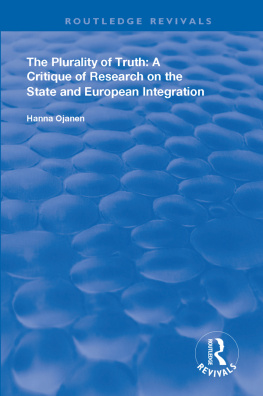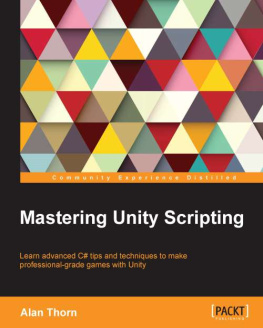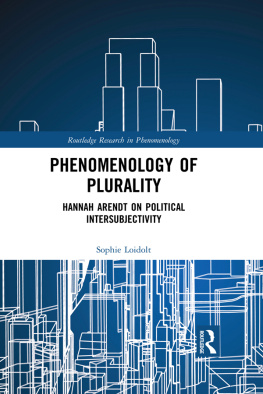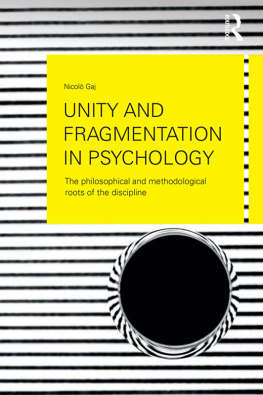ROUTLEDGE LIBRARY EDITIONS:
POLITICAL THOUGHT AND
POLITICAL PHILOSOPHY
Volume 46
UNITY, PLURALITY AND
POLITICS
UNITY, PLURALITY
AND POLITICS
Essays in Honour of F. M. Barnard
Edited by
J. M. PORTER AND RICHARD VERNON
First published in 1986 by Croom Helm Ltd
This edition first published in 2020
by Routledge
2 Park Square, Milton Park, Abingdon, Oxon OX14 4RN
and by Routledge
52 Vanderbilt Avenue, New York, NY 10017
Routledge is an imprint of the Taylor & Francis Group, an informa business
1986 J. M. Porter, Richard Vernon and contributors
All rights reserved. No part of this book may be reprinted or reproduced or utilised in any form or by any electronic, mechanical, or other means, now known or hereafter invented, including photocopying and recording, or in any information storage or retrieval system, without permission in writing from the publishers.
Trademark notice: Product or corporate names may be trademarks or registered trademarks, and are used only for identification and explanation without intent to infringe.
British Library Cataloguing in Publication Data
A catalogue record for this book is available from the British Library
ISBN: 978-0-367-21961-1 (Set)
ISBN: 978-0-429-35434-2 (Set) (ebk)
ISBN: 978-0-367-25408-7 (Volume 46) (hbk)
ISBN: 978-0-429-28771-8 (Volume 46) (ebk)
Publishers Note
The publisher has gone to great lengths to ensure the quality of this reprint but points out that some imperfections in the original copies may be apparent.
Disclaimer
The publisher has made every effort to trace copyright holders and would welcome correspondence from those they have been unable to trace.
F.M. BARNARD
Photographed by Erik Singer
unity
plurality
&
politics
ESSAYS IN HONOUR OF F.M. BARNARD
EDITED BY
J.M. PORTER AND RICHARD VERNON
J.M. Porter, Richard Vernon and contributors 1986
Croom Helm Ltd, Provident House, Burrell Row,
Beckenham, Kent BR3 1AT
Croom Helm Australia Pty Ltd, Suite 4, 6th Floor,
6476 Kippax Street, Surry Hills, NSW 2010, Australia
British Library Cataloguing in Publication Data
Unity, plurality and politics: essays in honour
of F. M. Barnard.
1. Political science
I. Porter, J. M. II. Vernon, Richard
III. Barnard, F. M.
320.01 JA71
ISBN 0-7099-2620-0
Printed and bound in Great Britain by
Biddles Ltd, Guildford and Kings Lynn
CONTENTS
Heines Various Concepts of History
Hanna Spencer
Unity and Diversity in Politics: Cassirers Mythic Mode Revisited
Willard A. Mullins
The Fatherland in Machiavelli
Anthony Parel
Rousseau: Will and Politics
J.M. Porter
A Public Goods Approach to the Theory of The General Will
David Braybrooke
The Rise and Fall of Marxist Ideology in Communist Countries
Eugene Kamenka
The Decline of Utopian Ideas in the West
Isaiah Berlin
Moral Pluralism and the Liberal Mind
Richard Vernon
Pluralism, Community and Human Nature
Caroline McCulloch and Geraint Parry
Frederick M. Barnard: A Bibliography
Janet Menard
ACKNOWLEDGEMENTS
Acknowledgements are made to the Japan Foundation, under whose auspices Isaiah Berlins essay was first delivered as a lecture: to Erik Singer, for the photograph which faces the title page: to the Dean of Social Science, University of Western Ontario, for assistance with editorial costs; and to the J.B. Smallman Publications Fund of the University of Western Ontario and the Presidents Publication Fund of the University of Saskatchewan for subsidies in aid of publication of this volume.
Nations have a unity often described as cultural; and within them there are divergences some of which are termed political. But culture and politics do not, therefore, comprise two wholly distinct zones or orders of experience, the one marked by unity, the other by plurality. For in political experience what is diversely viewed may be unity itself: that is, rivalry may concern the themes or the symbols or the history in which identity may be found, though what is found there is not always the same, nor necessarily self-consistent. Similarly, just as plurality within nations may not be absolute, the plurality of nations is not wholly unqualified. For the diverse local ways of living and understanding termed cultures may share a common human experience. It is differently mediated, as it were, in each national experience, just as national identity is itself subject to discrepant political interpretations.
The above thoughts are meant to resemble at least approximately Herders. The relevance of noting them here is that F.M. Barnard has taken Herders thoughts not as a subject of mere historical curiosity nor as mere dogma but as the source of questions which demand attention. For some, the history of ideas has at best only an oblique relation to contemporary concerns: it is one of the strengths of F.M. Barnards writings, however, that they insist on the interdependence of the historical and the contemporary. Intellectual history, political sociology and political philosophy may be present in varying proportions in his writings, but are never wholly detachable from one another. We may thus ascribe to him something which Hanna Spencer, in her contribution below, attributes to Heine: an uncanny sensitivity to the portents of ideas.
That ideas have consequences is implied, above all, by the central political concerns of F.M. Barnards writings. His concern has not been to advance one kind of politics or another; he has sought to rediscover what necessarily forms the context of political life. And politics, however its ends are conceived, is scarcely sustainable in a context in which all human actions are held to be reducible to, and thus explainable by, causes independent of the actors purported reasons, will or intentions. Hence it has been a continuing task to explore the relation between reason and action, will and action, culture and politics; here, too, what F.M. Barnard has written has been consistently informed by an acute sense of the relevance of one realm for another.
We have tried to capture something of this sense in planning this volume. We solicited contributions from scholars familiar with F.M. Barnards work, drawing their attention to the theme noted above, but imposing no limitations on topics or styles of enquiry. The results, unsurprisingly, cover a good deal of ground. But whether the essays have taken as their overt theme that of history, or myth, or patria, or political will, or community, they shed light upon the terms through which societies experience and interpret their own unity, and also come to terms with, or else suppress, their own plurality. They do not suggest any single answer. They do, however, attest to the importance of the question which F.M. Barnard has tried to keep before us; and they may remind us that as he has always insisted what constitutes politics is itself a question, and not someones answer to it.

